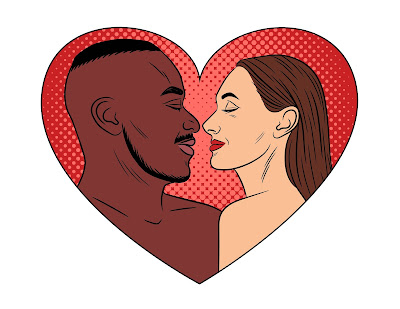Emophilia means falling in love too hard and too fast (see my article: Falling In Love With the Fantasy Rather Than the Reality).
People with emophilia prioritize the exhilarating feeling of falling in love over the practical evaluation of a partner which often sabotages long term relationship success.
What Are the Problems With Emophilia?
The problem with emophilia is that it can lead to:
- Risky behavior
- Poor relationship choices
- Potential exploitation by a partner
- Heartbreak
People who have problems with emophilia often overlook red flags because they rush into relationships without knowing the other person.
This also puts them at risk for getting involved with partners who have Dark Triad personality traits including:
- Narcissism
- Machiavellianism
- Psychopathy
The impulsivity of emophilia results in unhealthy patterns, power imbalances and repeated cycles of intense highs followed by heartbreak as opposed to a stable, healthy connection.
Emophilia often overlaps with an anxious attachment style because these people seek intense attachments to feel whole or avoid rejection.
Key Issues of Emophilia:
- Ignoring Red Flags: The intense rush of feelings overshadows the warning signs. This makes people ignore manipulative and toxic behavior. There is a tendency to only focus on their partner's seemingly positive traits while being in denial about the toxic traits.
- Attraction to Toxic Partners: These individuals tend to be attracted to people with Dark Triad traits (as mentioned earlier). This leads to a repetition of harmful relationships.
- Impulsive and Risk Behavior: This can include unsafe sex and making a commitment to a relationship before knowing the other person well (e.g., getting married or moving in quickly).
- Relationship Imbalance: An example of this is saying "I love you" too quickly which puts pressure on the other person and creates a relationship imbalance and resentment.
- Emotional Volatility: This pattern usually involves quick, intense romantic involvement followed by instability or drama instead of deep sustainable love.
- Exploitation: Charismatic individuals with Dark Triad personality traits can easily exploit their partner's quick emotional investment for their own selfish gains. Individuals with Dark Triad traits often start relationships by love bombing their partner--not because they are so interested in their partner but because they want their partner to fall for them quickly so they can manipulate them.
Clinical Vignette
The following clinical vignette is a composite of many different cases with all identifying information changed to protect confidentiality:
Beth
After the breakup of her fourth relationship, Beth sought help in therapy at the suggestion of her close friends. They told her that they saw recurring negative patterns in the men she chose (see my article: Do Your Friends See Red Flags in Your Partner That You Don't See?).
Beth wasn't sure she agreed with her friends, but she knew she needed help to understand why each time she got into a relationship, she thought she met her soulmate, but after a while her partner lies, cheats and leaves her for another women (see my article: Why Looking For a Soulmate Will Disappoint You).
She told her therapist that her last partner, Bill, pursued her relentlessly after they met at a party. The day after they met, Bill sent her a beautiful bouquet of roses with an invitation to go to an exclusive restaurant.
From the moment she met Bill, Beth thought he was very handsome and charismatic. On their first date Bill told her that he couldn't stop thinking about her.
Beth felt like she was a princess in a fairy tale by their second date. In her imagination, she could see herself walking down the aisle to marry Bill. She pictured their beautiful home with two children.
Her close friends warned her that she was allowing herself to fall in love with love rather than taking the time to get to know Bill. They also warned her that Bill was love bombing her, but Beth ignored them because she liked the feeling of being swept off her feet.
On their fourth date, when Bill told her that the lease on his Manhattan apartment was about to expire, Beth saw this as a sign they were meant to be together and she told him he could move in with her.
Their first week of living together was like a dream come true for Beth. She was sure Bill loved her, so one night when she made a special dinner for them, she told Bill that she loved him. Bill kissed her on the cheek, but Beth was disappointed he didn't tell her that he loved her too.
A few weeks later, Bill told her he was having dinner with a friend and she shouldn't wait up for him. When Beth asked him who he was having dinner with, Bill seemed annoyed and just repeated he would be home late.
When Beth woke up in the middle of the night and she realized Bill wasn't home yet, she became worried. She texted his phone, but her message wasn't delivered. Then she tried calling him, but her call went straight to voicemail.
When he walked in at 3 AM, Bill was startled to find Beth sitting on the couch waiting for him, "What are you doing, Beth? Why aren't you asleep?"
When she responded that she was worried because she couldn't reach him, Bill snapped at her. He said he didn't like her checking up on him and he refused to tell her who he was with and what he was doing.
After they had a big argument the next morning, Bill packed some pf his things and said he would be staying with a friend for a few days. Once again, he refused to give Beth any information.
When Beth called her friend Jane in a state of tears, Jane was quiet for a few seconds. Then, reluctantly, she told Beth she saw Bill kissing another woman at an outdoor restaurant. Jane felt devastated.
During the next two weeks Beth felt like she was on an emotional roller coaster. When she tried to talk to Bill about the other woman, he refused to talk to her. He slept on Beth's couch, left early in the morning before she woke up and came back after she was asleep.
Then, one day Bill didn't come home at all. When Beth got home from work, she discovered that all of his belongings were gone. He ignored her calls and texts for days. Then one day he sent her a short text that he was through with her and he told her not to contact him again.
Beth told her therapist that her prior relationships began and ended in similar ways and she couldn't understand why she had such "bad luck" in her relationships (see my article: Unhealthy Relationship: Bad Luck or Poor Choices?).
Her therapist provided Beth with psychoeducation about emophilia and helped Beth to see the connection between her relationship choices and her family history in a volatile family home with a depressed mother and narcissistic father who had extramarital affairs.
Her therapist talked to Beth about trauma therapy to work through her traumatic family history which she was unconsciously repeating in her relationships.
Beth worked through her traumatic history in trauma therapy with a combination of EMDR therapy and IFS Parts Work Therapy (see my article: Combining EMDR and IFS Therapies).
The work was neither quick nor easy but, over time, Beth could feel she was freeing herself from her family history (see my article: Progress in Therapy Isn't Linear).
She was no longer attracted to men who had Dark Triad traits and when she met someone with these traits, rather than being charmed by him, she ended her contact with him quickly.
She also took her time to get to know men she liked before she made a commitment to be in a relationship.
Conclusion
Emophilia isn't a psychiatric diagnosis. It's a personality trait characterized by a powerful drive to experience the thrill of falling in love without assessing a potential partner.
These individuals tend to attract partners with Dark Triad traits because they fall in love with love and they are easy to manipulate by these type of partners.
Get Help in Therapy
If you recognize that you tend to fall in love too hard and too fast, seek help from a licensed mental health professional who has an expertise in this area.
A psychotherapist who has an expertise in trauma therapy can help you to become aware of your relationship patterns and overcome the underlying issues driving these unconscious patterns,
Once you have worked through these issues, you can make better relationship choices and live a more fulfilling life.
About Me
I am a licensed New York psychotherapist, hypnotherapist, EMDR, AEDP, EFT (for couples), Parts Work (IFS and Ego States Therapy), Somatic Experiencing and Certified Sex Therapist.
As a trauma therapist, I have over 25 years of experiencing individual adults and couples.
To find out more about me, visit my website: Josephine Ferraro, LCSW - NYC Psychotherapist.
To set up a consultation, call me at (917) 742-2624 during business hours or email me.







.jpg)

.jpg)
.jpg)















.jpg)












